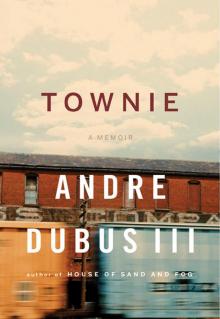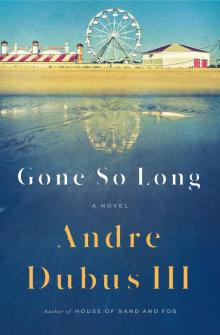- Home
- Andre Dubus III
House of Sand and Fog Page 2
House of Sand and Fog Read online
Page 2
Now I simply eliminate the lobby and every day walk down the concrete auto ramp into the shadowed belly of the building, where I unlock my automobile and retrieve the clothes I wore early this morning. I am never certain if there will be Persians in the elevator of our apartment building or not. In the cooler months I wear a suit, but now, in summer, I wear a short-sleeve dress shirt and tie, dress pants, and polished shoes with socks and belt. I leave these in a zipped garment bag laid out quite neatly in the trunk. The hotel elevator is carpeted and air-conditioned. I breathe the cool air into my lungs and soon I am in the second-floor lavatory opposite the ice machine, where I remove the auction notice from my front pocket, pull off my shirt, and wash my hands and bare arms and face. I shave for the second time today. I dry myself with the hotel’s clean paper towels, and I use cologne on my cheeks and deodorant under my arms. Today I change into brown slacks, a white pressed shirt, and a tan silk tie. I fold the auction notice into my wallet, wrap my work clothes and shoes in paper, then put them in the garment bag. When I step into the hallway and walk to the elevator, my covered clothes over my arm, my tie knotted correctly and straight, and my face shaved clean, I pass a Filipino maid pushing her cart and I take notice that she smiles. And even bows her head.
THE GENTLEMAN FROM the San Mateo County Tax Office gave to me a map for finding this home to be auctioned. He informed me to arrive by nine o’clock in the morning and be prepared to offer a ten-thousand-dollar deposit should I have a wish to purchase the property. He also to me said it was located upon a hill in Corona and if there were a widow’s walk on the roof, you would see over the neighbors’ homes to the Pacific Ocean below. I had not heard before this term “widow’s walk,” and so after traveling to the bank for a certified check of ten thousand dollars, I drove home to the high-rise and eventually last evening, after a dinner with Esmail and Nadereh where I revealed nothing, a dinner of obgoosht and rice and yogurt with cucumber followed by tea, I dismissed my son from the sofreh upon the floor where we eat barefoot and I searched for “widow’s walk” in our Persian-English dictionary. I found only “widow,” a word in Farsi I know quite well enough, and I felt a sadness come to me because this did not seem a good sign for the purchase of a home.
But this morning, that feeling had every bit disappeared from my body. Many summer evenings, instead of sleeping upon the sofa in my office, I rest on the carpet near the sliding door of the terrace with my head on a pillow beneath the leaves of the tree plants my Nadi cares for like her own children. Last evening the sky was clear, and sleep came for me as I watched the stars through the screen.
I rise with the first light from the east, and, after a shower and shave and a breakfast of toast and tea, I wake Esmail for his newspaper route. Then I dial the Highway depot and inform them of the summer flu I am suffering. I prepare tea for Nadi and bring it to the bedroom on a tray. The room is of course dark, with the shades drawn and the drapes closed, and I know she is awake because a cassette tape of Daryoosh’s sentimental music is playing softly beside her bed. I rest the tray on the bureau and open the drapes and both shades.
“Eh, Behrani. Nakon. Chee kar mekonee?”
My wife’s voice is still hoarse from sleep, and I know she again has not slept well. She says to me, “Don’t.” And, “What are you doing?” But this morning, for the first time since perhaps France, I know what I am doing; Colonel Massoud Amir Behrani knows what he is doing.
She sits up and I put carefully the tray upon her legs. I bend to kiss her cheek, but she turns her face from me and I sit down in the chair near her bed. My wife’s hair is thick and short, an area of gray near her face that she dyes black. Sometimes she applies too much and that part of her hair appears the color of a plum. Nadi has always worried about all that is not as it should be, and the overthrow of our society has aged her more than myself. But even still, her face is small and beautiful and many times when I am allowed to stand or sit in this shadowed room where she spends so much of her days, I hear the domback drum behind Daryoosh’s singing, and I see her and she has no longer fifty years, but twenty-five, and again, I desire to be with her in the fashion a man is supposed to be with his wife.
“What do you think you are looking at, Behrani?” she says in our mother language as she reaches for another sugar cube. She does not take her eyes from me. Her hair is tousled in the rear. I think of our children, and I smile at her and the cassette tape ends and the machine clicks off at once.
“Nadi-joon, today there may be a big opportunity for us.” I of course say this in English, but it is never any use for if she answers at all it is only in Farsi.
She says nothing. She turns over the Daryoosh cassette and she does not wait for me to proceed about this opportunity. She reaches to turn up the volume, and I rise and leave the room and dress into a summer’s weight gray suit.
It is not one of my finer sets of clothes, for I do not wish to appear pooldar, nor however do I wish to seem like a beggar in the marketplace. Before leaving, I kiss my son on the top of his head as he eats his cold cereal at the small breakfast table in the kitchen. His hair smells of sleep and needs washing. He is dressed in a loose T-shirt and shorts, and beside him on the floor is his skateboard and bag of newspapers. He has only fourteen years, but he is already my height—175 centimeters—and he has his mother’s face. Both my children have Nadi’s small, beautiful face.
THE HOUSE IS one-story but in a good state of repair. It is painted white and appears quite bright in this early sun that is already hot on my head that still carries no hat. There are hedge bushes beneath the windows and a small lawn of grasses in front that is in need of trimming. The street is called Bisgrove, and it is on a hill with houses built closely together on one side, a woodland on the other. But the county tax gentleman was correct; the street is not so steep one can see the water, only the pale morning sky so high and wide over the rooftops. Opposite the road are evergreen woods and brush and farther up are even more homes, all small, many with bushes and fences separating the lawns. I look once more at the woodland, at the fashion in which the sunlight drops through the branches, and I am thinking of our summer home in the mountains near the Caspian Sea, of how the light was the same in those trees along the winding earth road to our bungalow, and for a moment, I feel a sense of sarnehvesht, of destiny, and as soon as I do, I stand erect and look back at the property with as cool an eye as I am able, for I do not wish my judgment to be weakened at the point of sale.
Within thirty minutes we are all assembled, the county tax gentleman, the auctioneer, and only two prospective buyers: a young couple, a boy and his wife, who has not as many years as my daughter Soraya and is dressed in blue jean pants and white basketball shoes; and a gentleman close to my years, though very fat, as large as Torez, and he is dressed in a fine pair of suit pants but no jacket, simply a loose tie and white dress shirt that is stretched over his belly, and he is sweating on the forehead and above the lip. It is him I view as my main opponent, and all of his sweating makes me straighten my shoulders and I feel quite calm.
First, the county tax gentleman takes us for a walking tour through the bungalow. There is no air-conditioning, but the rooms are cool and I note every floor except for kitchen and bathroom is carpeted. The living room is large enough, and the dining area is a counter with stools where the kitchen begins. In the rear are three rooms, and as we step out in the backyard, I pat my breast pocket and touch the certified check from the Bank of America.
The young wife is very fond of the rear lawn, which is small and surrounded by evergreen hedges taller than a man. They shade us from the morning sun, and she begins to tell to her husband of the privacy they might have here, but it is the sweating gentleman, the radish, I am regarding. He stays close to the county tax officer and the auctioneer, who has as many years as me, carries a notepad and pen, and wears a department-store necktie and shirt. He has upon his face a confused expression, and he pulls the county tax gentleman aside for a quiet word.
/>
Then we continue around the side yard to the front, and the sale begins with the auctioneer’s suggested starting price of thirty thousand dollars. I am at once so astonished at this low figure that I do not respond and the young wife raises her hand and the auctioneer acknowledges her and the radish nods his head and the price is thirty-five thousand. The wife lifts her hand again, but the young husband forces it down and begins whispering loudly to her that they do not have that much saved, reminding her they are expected to pay all at once. My hand raises slightly from my side and the auctioneer points to me and the price is now forty thousand. The radish regards me with his wide wet face and his eyes become small, as if he is at once assessing me and my intentions as well as the numerous numbers in his head, and now it is clear to me he is a professional, a speculator, and he most possibly buys and sells dozens of these bungalows. I turn my face towards his and smile a most relaxed smile, one that is meant to invite him to bid all afternoon for I am prepared to do the same, sir, though of course I am not; I can barely go further than this, and I am not so certain any of this is wise.
“Forty-two fifty,” says the radish, his eyes still upon me.
“Forty-five,” my voice answers.
“Will there be a fifty-thousand-dollar bid for the property? Do I hear fifty, ladies and gentleman? Fifty thousand?” The auctioneer regards all our faces, our hands and fingers. The county tax officer consults his watch, and I feel the fat man’s eyes upon me, and I make my own look to the house as if I am prepared to bid and bid. The sun is hot upon my head.
“Forty-five thousand, going once, going twice—”
The radish turns and walks to his car, and now the auctioneer cries, “Sold,” and the county tax gentleman steps forward to shake my hand and receive the deposit which I hand to him from my jacket pocket. I sign his papers, and I hear the young couple drive back down the road, but already I am calculating what this house on this street might bring me in the open market, and I am certain I will surely be able to double my money. Yes, yes, I will put it up for sale as soon as we move in.
NADI NOTICES THE new hat upon my head before she says anything of the flowers I have brought her, tiger lilies, the flower gentleman in Ghirardelli Square named them. My wife still wears her sleeping gown, and she is polishing the silver tea table. On the carpet around her she has rested the crystal bowls of nuts, dates, and chocolates, each covered with plastic wrapping to protect them from the fumes of the silver polish. In Farsi she says: “You should have a brown colah on your head, Behrani, not blue.”
I know of course she is correct. The new hat I wear is of an artificial material, with a short visor like taxi drivers wear, and it is the color of a swimming pool. But I purchased it because in the shop’s mirror it gave me the appearance of a man with a sense of humor about living, a man who is capable to live life for the living of it. And when I bought the flowers, I naturally hoped my Nadi might also for a moment see things in this way. But as I put the tigers in a water vase and set them upon the floor, I find myself preparing a proposition of numbers in my head. This must be handled quite delicately.
“Nadi-joon?”
“Why are you not working today, Behrani?” She does not look up from her work. I want tea, but I feel the moment is now to be taken. I sit upon the sofa, close to the silver table and my wife.
“Nadereh, do you remember our bungalow near Damavand? Do you remember I ordered the trees cut down on the north side so we may view the Caspian?”
“Saket-bosh, Behrani. Please, be quiet.” My wife’s voice is weary and there is fear in it as well, but I must continue.
“Do you remember when Pourat brought his family there for our New Year’s and we celebrated spring on our terrace? And his khonoum, your dear friend, said what a gift from God to have the sea spread before us?”
“Hafesho, Behrani! What is the matter for you? Please.” She stops polishing and closes her eyes, and when she does this I see water gather beneath one eye, and I feel the moment has come.
“Nadi, I today bought for us another bungalow.”
She opens her eyes slowly, as if perhaps what I said is something she did not hear. “Do not joke. Why are you not working?” Her eyes are wet and dark and I think how in our country she would never let me see her like this: no cosmetics upon her face, her hair untended, still wearing what she slept in beneath a robe, doing what before only soldiers or women from the capital city did for us. But we have not looked at one another this directly in many months, and I want to hold her tired old face and kiss her eyes.
“I am not joking, Nadi.” I begin to tell her of the auction and the price no one would believe I paid for the home, and how of course the open market will pay us three times that, which is the point, Nadereh; this is the way for us to make significant money now, not Boeing or Lockheed, but real estate; we will live in the home for a short time and perhaps we will build a widow’s walk to increase further the value of the property and we will take our tea there where we can view the ocean and you will be very comfortable there, Nadi; you will enjoy to invite Soraya and our new son-in-law there until we sell it and find an even better home and perhaps—
It is now that she stands and throws down the polish rag and yells at me in Farsi she did not come to America to live like a dirty Arab! So kaseef! Some family roaming the streets like gypsies! All their possessions being damaged and ruined along the way! She stops and closes her eyes, raises her hand to the side of her head, her fingers trembling at the knowledge she has invited one of her migraine headaches. I watch her walk back to her room and close the door behind her. Soon I hear Daryoosh’s music on the cassette player in her room, the domback drum sounding as steady behind him as a march to bury the dead.
I lie back upon the sofa, no longer wanting tea, only rest. My wife has always been afraid. Both our fathers were lawyers in Isfahan, colleagues, good friends, and our marriage was their design since we were children. But I believe when I came of age I would have sent Nadi the flowers of hastegar anyway. She was always such a quiet girl, forever standing or sitting out away from the center of things, and her large brown eyes, so gavehee, looked often to me shiny with feeling.
Her confidence grew as an officer’s wife, and she began to speak back to me, but she always was so fair and kind with our children, and with the soldiers who served in our home. The night we fled, she trembled like a wet bird, and she let me direct everything while she held the children and repeated to them whatever it was I had already said when, at three o’clock in the morning, one week to the day after Shahanshah flew to Cairo and the imams and ayatollahs were making massive crowds in the streets, I and two captains stole a large transport plane and flew our families across the Persian Gulf to Bahrain. Nadereh and our driver, Bahman, and I loaded five suitcases of all we could carry into the trunk of the limousine. Nadi was afraid to drive through the streets in it; she was afraid a mob would attack us for being pooldar, and only six blocks west one of our finest hotels was burning. University students with beards were breaking open cases of Dom Pérignon champagne and pouring the contents of each bottle into the street drains. I assured my wife a dark car was best in the night, one with bulletproof windows.
On the flight over the black water, our wives and children sat in the middle of the wide cargo floor wrapped in blankets and the women sang songs to the youngest children who were so afraid because they had heard what had happened to our dear friends, the Pourats. They had heard how my rafeegh, General Pourat, and his family were stopped at the airport the previous day, accused of taking what was not theirs; the children had heard how the entire family was put on trial there in an empty baggage room, how they were made to stand in front of a wall with a large cloth banner which read in our language: MUSLIMS DO NOT STEAL FROM THEIR MUSLIM BROTHERS. MUSLIMS DO NOT TORTURE AND KILL THEIR MUSLIM BROTHERS. It was under this banner my friend’s wife and three young sons were one at a time shot to death. They were first forced to read aloud from the Koran. Then they were
killed. My friend, an officer admired by even the lowest of soldiers for his generosity and strength, was saved for last. They shot him numerous times in the head and chest. They then dressed his body in full uniform, and from the observation tower, hung him by the feet.
I close my eyes. I have grown accustomed to these images in my head, and it is not long before sleep begins to take me and I dream once again of a large cave full of naked children. They are dirty, their thin arms and legs streaked with dust. Hundreds of them. Thousands of them. And yet they are quiet, their faces raised to the darkness as if they are awaiting bread and water. Then Shah Reza Pahlavi and Empress Farah float through the crowd in a convertible limousine. They are dressed in long red robes covered with diamonds, rubies, emeralds, and pearls. Some of the children move from the path of the auto, but others are too small or weak and they are crushed beneath the wheels. Shahanshah and his queen wave to them, their wrists stiff and their smiles fixed. I sit in a pilot’s chair behind a large rock. My hands are on the controls, but I can do nothing but watch. I watch them all.
WEDNESDAY EVENINGS ARE not so busy at this convenience store/ gasoline station near San Pablo Avenue in El Cerrito; it is on Thursdays and Fridays when I am forced to hurry behind the counter like the young man with whom I work on those nights, and of course my legs are already very heavy from the long day working for Mr. Torez on the highway crew. This evening that is not the case, however, and for this I am grateful.

 Townie
Townie The Cage Keeper and Other Stories
The Cage Keeper and Other Stories House of Sand and Fog: A Novel
House of Sand and Fog: A Novel Dirty Love
Dirty Love Gone So Long
Gone So Long The Garden of Last Days
The Garden of Last Days House of Sand and Fog
House of Sand and Fog The Cage Keeper
The Cage Keeper